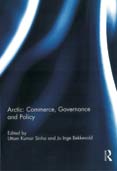Explaining Non-Arctic States in the Arctic Council
How has the role of observers in the Arctic Council evolved and why is there increased interest in participation by states and international institutions? This article examines the influence and interest of observers in international institutions. The Arctic Council is an international institution founded in 1996 to promote Arctic environmental protection and sustainable development. Ultimately, observers are weak actors in the Council. Despite this weakness, actors seek to become observers for two reasons.
- Andrew Chater
- May 2016






